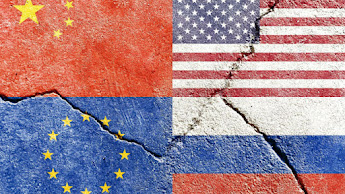 |
Me First, America 19th, the Planet Last: A Closer Look at Prioritizing National Interests |
Me First, America 19th, the Planet Last: A Closer Look at Prioritizing National Interests. In an ever-evolving world, the delicate balance between national interests and global cooperation has become a topic of intense debate and contemplation. The concept of "Me First" policies, particularly in the context of the United States, has garnered both support and criticism. As we delve into the intricate landscape of international relations, economics, and diplomacy, it becomes evident that the approach of placing America first can have significant implications for not only the nation itself but also for the global community. This article seeks to provide a comprehensive analysis of the "Me First" ideology, its historical context, economic ramifications, diplomatic considerations, and potential alternatives for a more harmonious world order.
The Historical Underpinnings of "Me First"
From a historical perspective, the idea of prioritizing one's nation over global concerns is not a novel concept. Throughout history, nations have often pursued policies that safeguard their interests, often placing their own needs ahead of broader global considerations. In the case of America, the term "America First" gained prominence during World War I, when there was a strong sentiment against entangling alliances and foreign interventions. This isolationist approach resurfaced periodically, notably in the aftermath of World War II, fueling debates about the nation's role in international affairs.
Economic Implications: Balancing National Prosperity and Global Economy
When examining the economic dimension of "Me First" policies, it becomes evident that the focus on domestic industries and markets can lead to short-term gains. Protectionist measures, such as tariffs and trade restrictions, can shield domestic industries from foreign competition, thereby safeguarding jobs and economic stability. However, a myopic approach that disregards the benefits of global trade can hinder long-term growth and innovation. The interconnectedness of the modern economy means that a nation's economic health is often intertwined with the prosperity of its trading partners.
Diplomatic Complexities: Navigating Alliances and International Relations
The intricacies of international diplomacy further underscore the complexities of "Me First" policies. While advocating for one's national interests is a legitimate pursuit, it's essential to recognize the significance of alliances and partnerships. Collaborative efforts can address shared challenges, such as climate change, terrorism, and pandemics, more effectively than unilateral actions. An approach that values cooperation alongside self-interest can foster stronger international relations and contribute to global stability.
The Path Forward: Balancing Self-Interest and Global Responsibility
As the world becomes more interconnected and interdependent, a holistic approach that strikes a balance between national interests and global responsibility emerges as a prudent strategy. Instead of isolating oneself, nations can embrace a "Responsible Globalism" approach. This entails prioritizing national well-being while recognizing that a secure and prosperous world benefits all. Initiatives like fair trade agreements, climate accords, and humanitarian collaborations can serve as mechanisms to achieve both domestic goals and international harmony.
Me First, America 19th, the Planet Last: A Closer Look at Prioritizing National Interests
In conclusion, the concept of placing "Me First" is a complex and nuanced topic that warrants thoughtful examination. While advocating for national interests is essential, it is equally vital to acknowledge the global implications of such policies. History, economics, and diplomacy converge to emphasize that a balanced approach, one that values cooperation, responsibility, and self-interest, can pave the way for a more harmonious world. By recognizing the mutual benefits of a well-connected global community, nations can work collectively to address the challenges of our time.







0 Comments